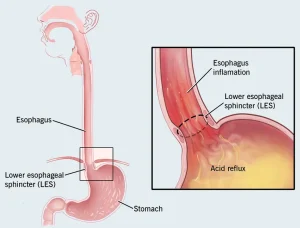Overview
Diagnosis
A healthcare professional can often diagnose gastroesophageal reflux disease (GERD) by reviewing your medical history and symptoms, followed by a physical examination. To confirm the diagnosis or check for complications, additional tests may be recommended.
Common diagnostic tests for GERD include:
-
Upper endoscopy
This procedure uses a small camera attached to a flexible tube to examine the inside of the esophagus and stomach. It helps identify inflammation or other complications. A tissue sample, called a biopsy, may be collected to check for Barrett esophagus or other abnormalities. If a narrowing is found, the esophagus may be gently stretched or dilated during the same procedure to improve swallowing. -
Ambulatory acid (pH) probe test
A monitor is placed in the esophagus to measure how often and for how long stomach acid moves upward. The monitor connects to a small device worn around the waist or over the shoulder.
The monitor may be a thin, flexible tube inserted through the nose or a small clip placed during an endoscopy. The clip naturally passes out of the body within a few days. -
X-ray of the upper digestive system
After drinking a chalky barium liquid, X-rays are taken to show the shape and condition of the esophagus and stomach. This helps detect narrowing, ulcers, or other abnormalities that may interfere with swallowing. -
Esophageal manometry
This test measures the muscle contractions and coordination in the esophagus during swallowing. It helps assess whether the muscles and sphincter are working properly, especially in people who have trouble swallowing. -
Transnasal esophagoscopy
A thin, flexible tube with a video camera is passed through the nose and into the esophagus. The camera transmits live images to a screen, allowing a close look for any damage caused by acid reflux.
Treatment
Initial treatment for GERD usually focuses on lifestyle changes and nonprescription medicines. If symptoms persist after a few weeks, prescription medications or procedures may be considered.
Nonprescription medicines include:
-
Antacids
Over-the-counter antacids such as Mylanta, Rolaids, and Tums can provide quick relief by neutralizing stomach acid. However, they do not heal inflammation or esophageal damage. Overuse can cause side effects such as diarrhea or, in some cases, kidney problems. -
Histamine (H-2) blockers
These medicines reduce acid production and offer longer relief than antacids. Common options include cimetidine (Tagamet HB), famotidine (Pepcid AC), and nizatidine (Axid). Stronger versions are available by prescription. -
Proton pump inhibitors (PPIs)
PPIs are stronger acid blockers that help heal the esophagus. Over-the-counter options include lansoprazole (Prevacid), omeprazole (Prilosec OTC), and esomeprazole (Nexium). Inform your healthcare provider if you begin using them regularly.
Prescription medicines include:
-
Prescription-strength proton pump inhibitors
These include esomeprazole (Nexium), lansoprazole (Prevacid), omeprazole (Prilosec), pantoprazole (Protonix), rabeprazole (Aciphex), and dexlansoprazole (Dexilant). They are generally well tolerated, though some people may experience diarrhea, headaches, or nausea. Rarely, they may cause low vitamin B-12 or magnesium levels. -
Prescription-strength H-2 blockers
Stronger forms of famotidine and nizatidine can help reduce stomach acid and relieve symptoms. Side effects are usually mild. -
Potassium-competitive acid blockers (P-CABs)
This newer class of medication, including vonoprazan (Voquezna) and tegoprazan (K-Cab), may be used when other medicines are ineffective.
Deep-breathing training
Diaphragmatic breathing, or deep-breathing exercises, can help some people manage GERD symptoms. This involves breathing deeply into the diaphragm after meals, rather than shallow breathing into the chest. It is best learned under the guidance of a trained medical professional.
Surgery and Other Procedures
Most people manage GERD effectively with medicine and lifestyle changes. However, when symptoms persist or long-term medication use is undesirable, surgical or endoscopic options may be considered.
Common surgical and procedural treatments include:
-
Fundoplication
The surgeon wraps the upper part of the stomach around the lower esophageal sphincter to strengthen it and prevent acid reflux. This is often performed using minimally invasive laparoscopic techniques. The wrap may be complete (Nissen fundoplication) or partial (Toupet fundoplication), depending on individual needs. -
LINX device
A small ring of magnetic beads is placed around the junction of the stomach and esophagus. The magnetic attraction keeps the junction closed to prevent reflux but allows food to pass through. The procedure is minimally invasive, and the device does not interfere with MRI scans or airport security systems. -
Transoral incisionless fundoplication (TIF)
This endoscopic procedure strengthens the lower esophageal sphincter by creating a partial wrap using polypropylene fasteners. It is performed through the mouth without external incisions, allowing for quicker recovery and minimal discomfort.
TIF is not suitable for people with large hiatal hernias unless combined with laparoscopic hernia repair.
Because obesity can increase GERD risk, weight-loss surgery may also be an option in certain cases. A healthcare professional can determine if you are a suitable candidate.
Advertisement

